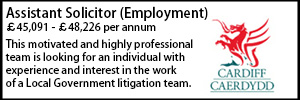Approaches to diversity, technology and adding value are the three most pressing issues for 2022 for legal profession, says senior judge
- Details
The three most pressing issues for the legal profession in 2022 are its approach to diversity, the adoption of new technologies, and the need to find ways to add value, the Master of the Rolls has said.
In a speech to The Legal Services Board: Reshaping Legal Services Conference 2022, Sir Geoffrey Vos – giving a personal opinion – said these issues were all connected.
On diversity, the Master of the Rolls said he was “concerned that, within the legal sector, women and people from different backgrounds are not always made to feel comfortable and included in the working environment”.
He also expressed concern at the legal sector's “ambivalence, or at least somewhat contradictory approach,” to the adoption of new technologies.
The issues are connected because adopting new technologies can and will improve diversity in the legal sector in ways that are not at the moment adequately understood, he argued.
Sir Geoffrey said the third most pressing issue was “the need to find ways in which lawyers can add value and, therefore, be properly and appropriately remunerated for work in the brave new world of 2022, without so often following the business practices and methods of the 20th century”.
This is connected to the issues of diversity and technology, again in ways that are not always fully grasped, he suggested.
The Master of the Rolls said: “Equality, diversity and inclusion, like social mobility, is sometimes regarded as too big a problem to do anything about. I do not accept that that is so. If we do nothing, nothing will improve.
“First, we can move towards a digital justice system where much more of the work is done online and can be undertaken from home and at times that better suit the lives of those with other responsibilities.
“Secondly, we can and must train all lawyers and judges at all levels to understand better the principles of inclusion, of making themselves fully aware of how they are seen by others, and of making people of all kinds and from all backgrounds feel comfortable and on an equal footing in the workplace.
“There are many more steps we can and should take. But I would sound one word of warning. It is important to take the entire community - in this case of lawyers and judges - with you on the journey. Like so many problems affecting humanity, the solution is education, not shouting.”
Litgation Solicitor
Legal Director - Government and Public Sector
Locum roles
 Masterclass – MCA and Court of Protection - Legal Update - Peter Edwards Law Training
Masterclass – MCA and Court of Protection - Legal Update - Peter Edwards Law Training
21-01-2026
Online (live)
 Turning Up the Heat on Regulation: Are you Ready? - Cornerstone Barristers
Turning Up the Heat on Regulation: Are you Ready? - Cornerstone Barristers
21-01-2026 2:00 pm
Online (live)
 Managing settlements: the legal and practical issues, and the pitfalls to avoid - Blake Morgan
Managing settlements: the legal and practical issues, and the pitfalls to avoid - Blake Morgan
22-01-2026 10:00 am
Online (live)
 Law Enforcement Data Processing and Part 3 of the DPA 2018 - Act Now
Law Enforcement Data Processing and Part 3 of the DPA 2018 - Act Now
27-01-2026 10:00 am
Online (live)
 CCTV, Drones and Body Worn Cameras: Ensuring Data Protection Compliance - Act Now
CCTV, Drones and Body Worn Cameras: Ensuring Data Protection Compliance - Act Now
30-01-2026 10:00 am
Online (live)
 Understanding GDPR Accountability and Conducting Data Protection Audits - Act Now
Understanding GDPR Accountability and Conducting Data Protection Audits - Act Now
03-02-2026 10:00 am
Online (live)
 The Hillsborough Law Bill: Navigating New Duties and Public Law Implications - Landmark Chambers
The Hillsborough Law Bill: Navigating New Duties and Public Law Implications - Landmark Chambers
03-02-2026 10:00 am
Online (live)
 Construction: Recourse through the Building Safety Act – Where did we land in 2025? - Devonshires
Construction: Recourse through the Building Safety Act – Where did we land in 2025? - Devonshires
03-02-2026 2:00 pm
Online (live)






































































































































 Enforcement Notices - Getting the notice right - Ivy Legal
Enforcement Notices - Getting the notice right - Ivy Legal  Standish 18 months on - 42BR
Standish 18 months on - 42BR  Alliancing & Building Safety - Sharpe Pritchard
Alliancing & Building Safety - Sharpe Pritchard  HMPL Building Blocks: Hoarding – a guide for beginners - Devonshires
HMPL Building Blocks: Hoarding – a guide for beginners - Devonshires  Accelerating EV Charging Infrastructure in the Public Sector - DWF
Accelerating EV Charging Infrastructure in the Public Sector - DWF  Education Law Conference - 3PB
Education Law Conference - 3PB 